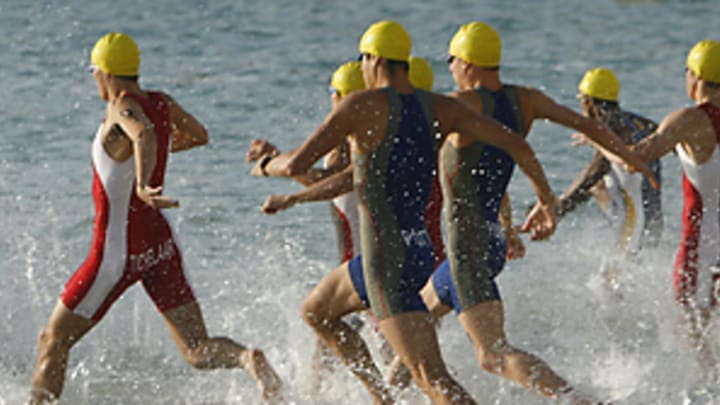Dangers of open-water swimming


My first newspaper job after college was at the Vineyard Gazette on Martha's Vineyard, an island in Massachusetts surrounded by sea and ocean, some of it very moody and turbulent. Once a summer, the editor, Henry Hough, would publish an editorial under the headline "Beware the Riptide," or some similar wording. Among other things, the piece told you what to do in a riptide. In that same spirit, and with spring-break here, I'd like to point you to the United States Lifesaving Association Web site, USLA.org, for a primer on safe open-water swimming.
Fort Lauderdale, the American capital of the spring break, has three miles of ocean beach and an incredible record of safe swimming. "In the City of Fort Lauderdale, we've never had a fatality, not in my 25 years here," says the city's chief of ocean safety, Breck Ballou. "Our philosophy is prevention. Swim with a friend. Swim on a guarded beach. Know what to do in a rip current. Know what to do if you're feeling panicky."
But the harsh truth is that any swim can end fatally. A swimmer has a panic attack, a heart attack, he becomes dehydrated -- some odd thing happens. Last October, a beloved and accomplished long-distance open-water swimmer, Fran Crippen, 26, died in unusually warm water while competing in the 10K (6.2 miles) FINA Marathon Swimming World Cup race off the coast of Fujairah, in the United Arab Emirates. The 1,500 mourners at his funeral at a parish church outside Philadelphia, including Crippen's celebrated swimming family, never learned what really happened to him. Officially, it was a death by drowning.
They might seem like different worlds, the kind of competitive swimming Crippen did and what you or I might do casually in South Florida or Mexico or southern California. But really, whenever anybody swims in open water, there's no fullproof safety net. "However many lifeboats were out there, there wasn't one for Fran," says Crippen's sister, Maddy, a former Olympic swimmer. Fran's high school coach at Germantown Academy, Dick Shoulberg, says he is committing the rest of his life to improving safety precautions in competitive open-water swimming.
The Crippen family lives near Philadelphia where there's an annual Olympic-length triathlon that begins with a .9-mile swim in the Schuylkill River within the city limits. I did it for the first time in 2009. The swimming, for me, was the enjoyable part.
Last year, I signed up for the triathlon again, held on the final Sunday in June. At sunrise we all learned that the swimming portion had been canceled. The previous day, during the first leg of a sprint triathlon connected to Sunday's main event, a competitor had gone missing and his body had not been recovered. The organizers replaced the swimming portion by adding a 5K run for the Sunday race. There was a pall over the entire thing.
The athlete was eventually found. He was a 40-year-old mailman from the Philadelphia suburbs named Derek Valentino competing in his first sprint triathlon. He was an experienced and fit runner and biker, but had never done any competitive open-water swimming before.
"He was a strong swimmer," says Michele Valentino, Mr. Valentino's proud wife. She and Derek had gone to her high school prom together. There were about 100 swimmers in his heat and Michele believes that the race organizers took every possible precaution. "I think it was a tragic accident. I believe he got kicked and that knocked him out." His was a death by drowning, too.
About six weeks later, Michele was visiting friends on the Jersey Shore, in Wildwood. At first, she was hesitant about entering the ocean, but she did. She was drawn to the water, like so many of us are. She thought of her late husband.
Maddy Crippen learned to swim at the Jersey Shore herself, in Avalon. Her parents pushed their children into swimming not for sport but for safety reasons. Unlike her brother, Maddy was never comfortable as an open-water swimmer. She likes the security of a nearby wall. But this summer she plans to meet her fears head-on and is signed-up for a sprint triathlon that starts with a swim in the Schuylkill.
For Fran Crippen, open-water swimming was a fundamental part of his life. Derek Valentino was drawn it to expand the athletic challenges of his life. Maddy Crippen and Michele Valentino and you and I might have different reasons about why we want to swim in an unknowable pool that has no walls. You might find it refreshing or exhilarating or liberating or challenging or relaxing or scary. For me, it's all those things. "Come on in, the water's fine," the old-timers say. It likely is. It's better than fine. Open-water swimming is about as much fun as you can have with a swimsuit on. The point here is to urge you to be safe about it.
On May 7, the International Swimming Hall of Fame, in conjunction with the Crippen Foundation, is holding a one-mile open-water swim, to raise funds for the cause of safe swimming and to raise awareness as well. The event will be in Fort Lauderdale. How fitting.
